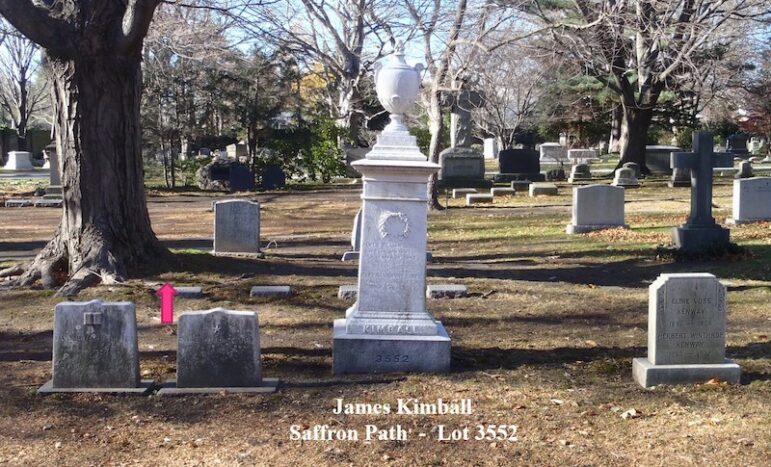
By Bill McEvoy
In honor of Memorial Day, local historian Bill McEvoy has compiled histories of some of the Civil War clergy who are buried at Mount Auburn Cemetery. This is part five of 15.
James Sherman Kimball was born, on January 26, 1844, in Boston. He died on December 16, 1864, in Nashville, Tennessee, from a fever.
He was the son of James W. and Mary Tappan Kimball. His Father was a merchant and wrote for the American Tract Society. The Tract was a publication of the nonsectarian but evangelical organization founded on May 11, 1825.
From early life, he realized he wanted life from above which our Lord recommended to Nicodemus. He sought and found it in the Christian Commission. James was a nonsectarian Evangelical.
From that hour he stood committed to hearty cooperation in every Christian endeavor to diffuse light, love, and kindness. He began Evangelizing at 14.
Weak eyes compelled him to exchange the school for a farm. Gaining some strength by that means, he finished his preparation for college at a military school, where he found that, with no religious society, his interest in religion increased daily.
While a member of Williams College’s Class of 1866, he sought religious conversation with every member of his class, and even with those in other classes. During the six weeks of the Christmas break in 1862, went to Camp Convalescent – Alexandria, Camp Misery – Fredericksburg, and Falmouth, Virginia.
In his first long vacation, he offered his services to the Christian Commission, and was sent to the Army of the Potomac, where he labored heartily.
In his second college year, finding that he could use his eyes but two hours a day, and feeling deep sympathy for his country, and for our brave soldiers, he determined to renew the offer of his services to the Christian Commission.
After four weeks of labor in Louisville, Kentucky., he was transferred to Nashville and “the front.”
He wrote from Nashville:
“I have the offer of a commission as lieutenant in the army. I have thought and prayed over it and concluded that I had better remain in the service of the Christian Commission. I am already here. I know I can do good. To take a commission would be an experiment. I am inclined to think that a permanent delegate can do as much good as a chaplain in the army.”
Five weeks’ service in Nashville terminated his earthly work. He took a severe cold, as a consequence of lending his shawl to a sick soldier. A fatal fever followed. While he lay dying, General Hood’s army was besieging Nashville.
As his chamber windows shook with guns from Fort Negley, multiplied into a hundred batteries along the line, his zeal for saving men kindled anew.
In spirit, he was passing through the barrack and hospital wards, gathering imagined congregations, leading them in song and prayer, and exhorting them most earnestly to a new life.
So, he continued to the last. It was the very soul — Kimball himself, after an overworked brain had given out, holding fast to the one idea of his life — salvation now for those who believe in Christ.
It was very touching to hear him, in his wanderings, pray for the soldiers, and then ask someone at his bedside to pronounce the benediction. Thus, he passed, through fever and delirium, above war and weariness, to his rest, to be forever with the Lord one other.
As he was dying, other Christian Commission Delegates were on the field, ministering to the hundreds of other American youths, who were falling under the cannon that shook the windows of his dying chamber; —such scenes have made one house in Nashville immortal in the memory of thousands of soldiers and hundreds of Christian laborers.
Find the gravesites of the Civil War Clergy by entering their name here: https://www.remembermyjourney.com/Search/Cemetery/325/Map Bill McEvoy can be reached at billmcev@aol.com